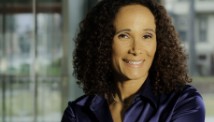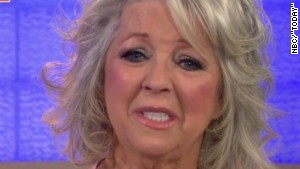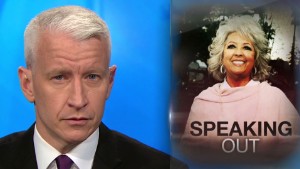Editor's note: Tricia Rose is the incoming director of Brown University's Center for the Study of Race and Ethnicity in America, where she teaches Africana studies. She is the author of "Black Noise: Rap Music and Black Culture in Contemporary America" and "The Hip Hop Wars: What We Talk About When We Talk About Hip Hop -- And Why It Matters."
(CNN) -- As Paula Deen's apology tour continues, it becomes more and more disturbing to watch.
With each heartfelt tearful statement, Deen seems completely uninterested in the broader contexts of her comments, missing ample opportunities to address the reality of racism today both in the form of cultural and social interactions, but even more powerfully by policies and actions.
I heard her speak very little about the extraordinary injuries and injustices black people face, I have not heard her show alliance with those who fight racism nor show solidarity with or compassion for black people based on the profound impact racism has on their lives.
 Tricia Rose Stay in touch! Don't miss out on the conversation we're having at CNN Living. Follow us on Twitter and Facebook for the latest stories and tell us what's influencing your life.
Tricia Rose Stay in touch! Don't miss out on the conversation we're having at CNN Living. Follow us on Twitter and Facebook for the latest stories and tell us what's influencing your life. What kind of heartfelt apology intended to prove you are not a racist ignores these gestures?
Deen is steadfast in her denials about being a racist. But she seems to explain away her actions or redirect the conversation when asked about the specifics of her comments and their implications.
Her reflections, apologies and justifications are striking in their inability to see things from the perspective of those she has offended, and how they might feel in the face of her actions.
Plus, she can't seem to connect her actions to broader, endemic conditions in society.
This could be a teachable moment to discuss how complex racism is, how good intentions cannot do the work of anti-racism education, and how even people who like black people can behave in ways that do racial harm.
 Paula Deen: Kill me if you never sinned
Paula Deen: Kill me if you never sinned  Paula Deen's emotional interview
Paula Deen's emotional interview Yes, Paula Deen, good people can hold racist ideas even though they might not be aware of them.
Instead, it has turned in to a maudlin, self-absorbed reality-TV style drama.
Her apology on the "Today" show on Wednesday is a case in point. In it, Deen was asked about her use of the N-word.
In reply, she emphasized that she had a gun put to her head and that the black man wielding it was someone to whom she had given a loan.
Her emphasis asks us to empathize with her. I guess we are to say, "Oh sure, with a gun to my head I'd resort to racial epithets, too, especially if I gave that N-word some loan money."
She has other options here: ones that might contribute to our broader racial conversation and knowledge about race.
She could have said: "It was a horrible word to use given its powerful centuries long role, especially in the South, as a way to dehumanize black people. And, my identity as a white Southern woman (one whose family were slave holders) only makes it worse. It undermines my belief in racial equality and counters my efforts to support racial justice."
Later in the interview, when "Today" anchor Matt Lauer returned to the issue of her use of the N-word, she deflected her use, and instead described how the constant use of the word by the young black staffers in her kitchen hurts HER.
What?
I am not a fan of black youth using the word so casually, extensively and publicly, but there is a remarkable lack of self-awareness to imagine that their use of the term is equivalent to her use of the word.
What does their use have to do with hers? How is it that we are talking about her injury again?
Her lack of awareness was evident again in her desire to have a plantation style wedding party, which would feature a black-only wait staff. She thought the black-only wait staff - who, in historical context would likely be performing as slave workers -- would be an entertaining theme.
Was she going to have the white guests perform Southern plantation era behavior of "cultured" and vicious racial domination, too?
Who was supposed to be entertained by this?
Perhaps some of the apology tour could be devoted to explaining her vision for this party and why she thought it a good idea.
And, ideally, this would be followed by an admission that she should have considered the downside of having black low-wage workers, who as a group face extraordinary levels of job discrimination and other hurdles, play slaves for white partygoers.
I suspect she imagines no ill racial intent in this, either.
Frankly, she isn't alone in this kind of thinking.
Our public understanding about how racism works today is thwarted by the personalized response that focuses on intention, rather than action.
"Good" people are very often blind to and support disturbing and discriminatory actions, behaviors and ideas. Today, there is widespread normalized racial discrimination. One study shows that white job applicants with a criminal record are nearly twice as likely to get a call back for low-wage work than equally qualified black applicants with a college degree and no criminal record.
For this apology tour to do real good, Deen might consider taking an anti-racist position, reaching out to black people and honoring the pain many face as a result of serious racial discrimination, and thinking about how she might have contributed to it.
Deen might use her extensive media platform to draw attention to racial injustice today, to show the broader public just how much it saturates American society, even for those who think they are above it.
{ 0 comments... read them below or add one }
Post a Comment